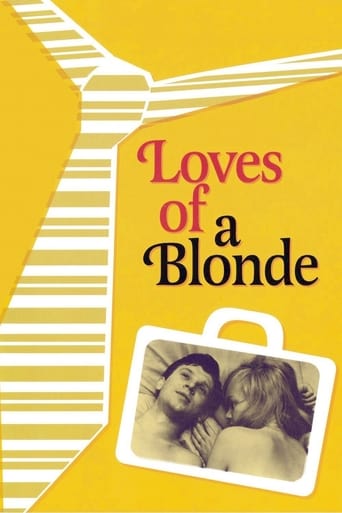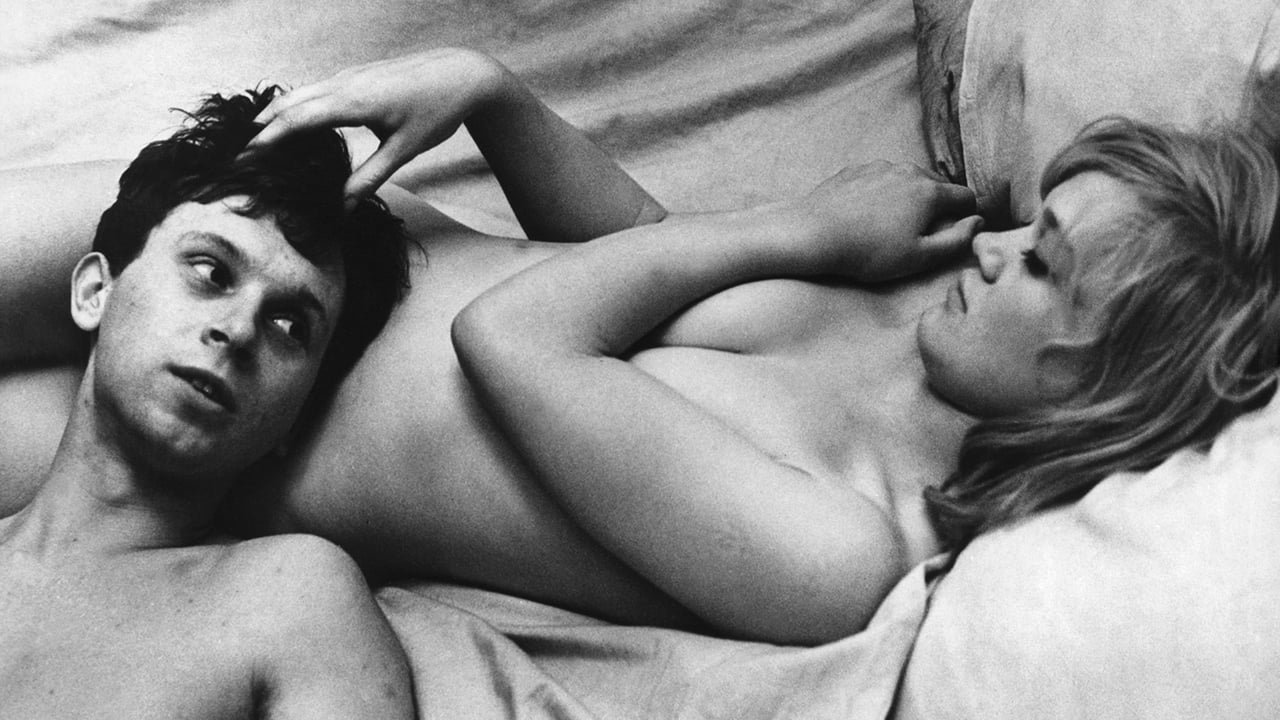gavin6942
A factory manager in rural Czechoslovakia bargains with the army to send men to the area, to boost the morale of his young female workers, deprived of male company since the local boys have been conscripted.Loves of a Blonde has often been identified as one of the most significant and ambitious productions of the Czech New Wave, a movement in which a group of young filmmakers, many of whom were educated by the national film academy in Prague, including Forman, Ján Kadár, Věra Chytilová and Jiří Menzel, among others, took significant political risks by using cinema to protest the hypocrisy and absurdity of the Communist state.I'll say it before and I'll say it again, of all the "new wave" movements in Europe, by far my favorite is the one that came out of the Czech cinema. The beauty, the honesty and sometimes the surrealism (though not here) is just spot on, and for me really captures what it means to have film as an art form. That Forman went on to become an international success is no surprise.
morrison-dylan-fan
With still having strong memories about being caught completely by surprise from Milos Forman's far better than expected 1984 epic Amadeus,I was thrilled to recently discover that a fellow IMDb'er had shared a link to a Youtube page of an early Forman movie from a film movement that I had recently been hearing quite a bit about called the Czech New Wave,which lead to me excitingly getting ready to surf the wave for the first time.The plot:Fearful over their being not enough boys for girls to fall in love for in his village,due to their only being one man to every 16 women in the village,a local businessman decides to do a deal with a military general,which will allow for restless soldiers to pay a visit to the town,in the hope that they end up becoming romantically involved with the residents.Attending a late night party with her dormitory friends,Andula tells her friends to ignore the advances that are getting made to them by a group of old,worn down soldiers.Leaveing her friends behind on the watchful gaze of the army men,Andula secretly pays a visit to a guy called Milda,who along with having played with played in a band earlier in the night,is also someone who Andula is starting to develop a real crush for.Half-heartedly accepting Milda's invitation for her to pay a visit to his room,so that Milda can read her palms,Andula soon begins to find out what direction her palm lines,and her life are heading in.View on the film:For the relationship between Andula (played by a cute,wonderfully uncertain Hana Brejchová) and Milda (played by a very good,manipulative Vladimír Pucholt),the screenplay by director Milos Forman and co- writer's Jaroslav Papousek, Ivan Passer and Václav Sasek use Andula's wish for the relationship to work as a sly way to include some subtle commentary on the communist regime of the time,with Andula working in a shoe shop factory making identical pares of shoes,being connected to the owner of the business trying to get all of the women of the village to settle down with men from the country's old,rusting military.Continuing on the films theme in his directing style,Forman and cinematography Miroslav Ondrícek show in stark black & white everything that Andula is up against in her desire not to conform,from Andula's village looking like a wasteland,and Forman placing the viewer in Andula's corner when a vote is taking at her dormitory for no boys to be allowed in the building.Forman also expertly reveals the full Horror's of what Andula is going against,when after making her first ever visit out of the village to see Milda's parents,Andula is met by the hard stare of Milda's mum,who openly tells Andula that she does not trust any outsiders.
Terrell-4
Milos Forman's Loves of a Blonde is a wonderful movie...sweet and awful. Sweet, because Forman gives us no one we can dislike as he tells us the story of Andula (Hana Brejchova), a young factory worker in the depressing town of Zruc, making endless pairs of shoes alongside dozens of other young women. Not Milda (Vladimir Puchott), the young piano player who comes to town with a band, seduces Andula, and then leaves for Prague. Not the factory bosses, or the other young women who are bored and eager for husbands (they outnumber the men 16 to one). Not even the regiment of aging, smoking, unattractive soldiers who were based in Zruc to lower the odds a bit. Not Milda's parents, who one day find Andula at their apartment door, suitcase in hand, because she gave her heart to Milda and took him seriously when he told her to come visit him in Prague sometime. And awful, in a desperate sort of way, because Forman let's us see the lives all these people live in a Communist society that is petty, officious and incompetent. We can smile at a lecture an older woman gives the young factory girls about maintaining their honor and dignity with boys; we can even smile when two young leaders stand up and call for a vote to dedicate all of them to this idea; and we can smile when every girl in the room raises her hand to vote in favor, none against and none abstaining. Then we realize it might not be a good idea to snicker at a vote in favor of honor when a boss thinks it would be a good idea. There are two long set pieces in the movie that are terrific. The first is a dance in town, held by officials so that the soldiers can meet the girls. We move around with the camera, listening in to the appalled girls as they really see these desperate, coarse guys, and listening to the guys as they eye the girls, drink for courage and, in one case, surreptitiously remove a wedding ring and then dropping it on the floor for all to see. There's that safe, chirpy dance music...the angling to get a girl to take a walk in the woods...the possibility that the bored girl will agree. The second set piece is in Milda's apartment in Prague. Andula has arrived unannounced. Milda is playing with the band at a nightspot and there are only Milda's parents to welcome her. And welcome they don't. They've heard nothing about her. It's clear Milda is in for a surprise when he gets home that night. Milda's mother is not someone you'd want for a mother-in-law. Milda's father is more realistic but not exactly comforting. Their apartment is a living space of ancient appliances, chipped paint and doilies. The nagging opinions of the mother and the exasperated gruffness from the father make us smile. Of course, they have the opposite effect on Andula, who now is close to tears. Forman seems to be quietly pointing out to us what living in Communist Czechoslovakia has come to mean. Poor Andula. Will she have a happy future with Milda? Or will she return to Zruc...wiser, perhaps, but with nothing better ahead for her. Watch the movie and hope for the best. Andula a nice person. Loves of a Blonde is so poignant and sweet it hurts a little. Forman used mainly non-actors for most the roles and he had a genius for either eliminating their self-consciousness or for making it work in the context of the story. The movie at the basic level of story-telling is effective because the people, from Andula to the bit parts of people at the dance, look and act like people who aren't acting. We wind up liking most of them and feeling indulgent toward the rest. The Communist regime eventually caught on to the picture of life in Czechoslovakia which Forman presented with such apparent good humor in Loves of a Blonde and The Firemen's Ball. It was happy to see Forman leave the country during the crackdown in 1968. Anyone who thinks Forman, when he came to America, lost his subversive sympathy for people who are at the mercy of institutions and governments needs to watch One Flew Over the Cuckoo's Nest, Ragtime or The People vs. Larry Flynt.
MartinHafer
I had very high hopes for this film, as I LOVED several other Czech films I've recently seen. However, once I finished the movie, I wondered WHY is it rated so highly? It had very poor and cheap cinematography and the story just did absolutely nothing for me. It was all about a town where there were MANY single ladies and not enough men. One of these women falls for a pianist and he convinces her to lost her virginity to him. Then, she travels to the city where he lives only to find out he really didn't love her but just wanted to get in her dress (i.e., he wanted sex--he was not a transvestite). THAT'S IT!!! Nothing more to this very bland story. It seemed like they had about 1/2 of a movie and just padded it.


 AD
AD



